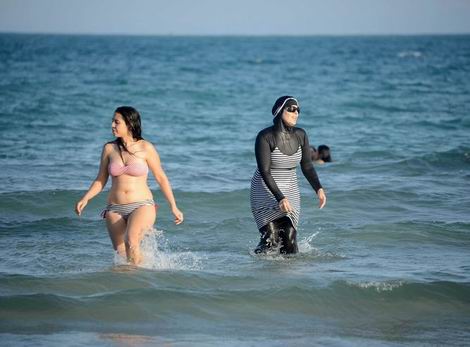
|
|

|
|
| April 24, 2024 |
|
Court overturns ‘burkini’ ban 
PARIS — France’s highest administrative court has overturned a town’s ban on burkinis, the full-body swimwear used by some Muslim women, setting a precedent that challenges similar bans in at least 30 other municipalities, most of them on the French Riviera.
The burkini — and the decisions to ban wearing them on beaches — has become the focus of spirited global debates over women’s rights, assimilation and secularism. In its ruling, the court, known as the Council of State, found that the ban in the town of Villeneuve-Loubet violated civil liberties, including freedom of movement and religious freedom, and that officials had failed to show that the swimwear posed a threat to public order. The ruling also made clear that the bans in other municipalities could be similarly overturned, and the Socialist government seemed conflicted on how to respond. In a statement, Interior Minister Bernard Cazeneuve suggested that it was time for the local officials to back down, saying it was now “up to each and every one to responsibly seek to ease tensions, which is the only way to avoid disturbances to public order and to bolster coexistence.” But later, Prime Minister Manuel Valls said in a statement on Facebook that the ruling “doesn’t exhaust the debate that has opened up in our society on the question of the burkini.” Mr. Valls, who last week likened the burkini to a form of “enslavement,” said in his comments on Friday that “condemning the burkini in no way questions individual liberties.” The court’s decision seemed unlikely to end the controversy as France enters a presidential election season. The center-right former president, Nicolas Sarkozy, who has announced his plans to run for president again, supports a national ban. While the decision does not apply directly to the many other French cities and towns that have banned the burkini, it amounts to a warning that their prohibitions are likely to be overturned if challenged. The largest such community is the city of Nice. The United Nations and the White House seemed relieved by the ruling. “Obviously we welcome the decision by the court,” Secretary General Ban Ki-moon’s chief spokesman, Stéphane Dujarric, who had expressed concern about the burkini ban, said at a news briefing, emphasizing “the need for people’s personal dignity to be respected.” Josh Earnest, a White House spokesman, said the United States did not want to “second-guess” France, but noted that President Obama “believes strongly in the freedom of religion.” Critics of the bans have said they unfairly targeted Muslims in the wake of deadly terrorist attacks in France and elsewhere in Europe. The bans provoked a backlash, particularly photographs spread online showing armed police officers confronting women wearing burkinis, or other clothing — like a veil, a tunic and leggings — covering most of the body. Patrice Spinosi, a lawyer for the Human Rights League, one of the groups that had challenged the ban, said his association would now ask mayors in other towns to withdraw their bans. “The council has ruled and has showed that mayors do not have the right to set limits on wearing religious signs in public spaces,” he said, in the absence of a demonstrated threat to public order. “It is contrary to the freedom of religion, which is a fundamental freedom.” Villeneuve-Loubet, a seaside resort of about 14,000, adopted the ban on Aug. 5, and it was supposed to end on Sept. 15. Police officers in the town will no longer be able to issue fines for burkini-wearing, and women who received fines will be able to contest them. (Source: New York Times) Story Date: August 29, 2016
|